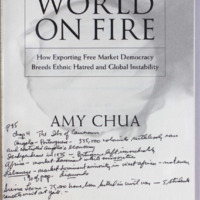-
Title
-
World on fire : how exporting free market democracy breeds ethnic hatred and global instability
-
Description
-
Examining the actual impact of economic globalization in every region of the world, from Africa and Asia to Russia and Latin America, Chua exposes an unexpected reality. In every one of these regions, free markets have concentrated disproportionate, often spectacular wealth in the hands of a resented ethnic minority. "Adding democracy to this volatile mix unleashes suppressed ethnic hatreds and brings to power ethno nationalist governments that pursue aggressive policies of confiscation and revenge. Chua also shows how individual countries may be viewed as market-dominant minorities at the regional or global level, a fact that may help to explain the Arab-Israeli conflict and the rising tide of anti-American sentiment around the world. America today has become the world's leading market-dominant minority, enjoying wealth and economic power wildly disproportionate to our numbers. This, perhaps more than anything else, accounts for the visceral hatred of Americans that we have seen expressed in recent acts of terrorism." "Chua warns that, far from making the world a better and safer place, democracy and capitalism - at least in the raw, unrestrained form in which they are currently being exported - are intensifying ethnic resentment and global violence, with potentially catastrophic results."--BOOK JACKET.
-
Identifier
-
1075021
-
385503024
-
Creator
-
Chua, Amy
-
Source
-
Brian Lamb Booknotes Collection
-
Gift of Brian Lamb, 2011.
-
Catalog record
-
Language
-
eng
-
Date
-
2003
-
Program air date: February 9, 2003
-
Publisher
-
Doubleday
-
George Mason University. Libraries. Special Collections & Archives
-
Text
-
Transcription of Annotations
Notes on front endpapers state the author's thesis that the global spread of markets and democracy is the principal aggravating cause of group hatred and ethnic violence throughout the non-Western world. This is in contrast to the views of Tom Friedman who believes that current crises can be solved through the establishment of multi-ethnic, pluralistic, free-market democracies. A list of market-dominant minorities throughout the world is included. Other notes refer to Bill Gates who owns 40% of American wealth, but experiences no resentment - unlike the Indian tycoons in India, the Eritrean businessmen in Ethiopia or the Jewish oligarchs in Russia. Institutions like the World Bank, the IMF or GATT were initiated by the U.S. to promote democracy around the world. Examples from various countries, e.g. Bolivia, Russia, Burma, Angola, and Zimbabwe, where small ethnic minorities control a large portion of the economy are used to illustrate the author's view point. -- Notes on back endpapers refer to the gulf between rich and poor, and state that this discrepancy was brought to the attention of the poor through television and American movies. The author sees the September 11 attacks as an act of revenge by the weak against the powerful which was motivated by feelings of humiliation and inferiority. The election of Hugo Chavez in Venezuela is mentioned as an example of a backlash against the corrupt minority white elite. Other notes point out the author's view that it is unrealistic for Americans and Europeans to demand instant democratization from developing and post-communist countries. Since market-dominant minorities in North Africa or the Gulf States are non-existent, the author believes that the introduction of democracy in these countries would lead to the ousting of the current rulers. -- Annotations by Brian Lamb in the margins and underlining of pertinent phrases throughout the book.
-
Subject
-
"International economic relations."
-
"Democratization."
-
"Globalization."
-
"Ethnic conflict."
-
Relation
-
Original Booknotes interview
-
Rights
-
This work may be protected by copyright laws and is provided for educational and research purposes only. Any infringing use may be subject to disciplinary action and/or civil or criminal liability as provided by law. If you believe that you are the rights-holder and object to Mason’s use of this image, please contact speccoll@gmu.edu.
 1075021.pdf
1075021.pdf